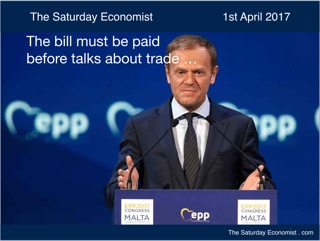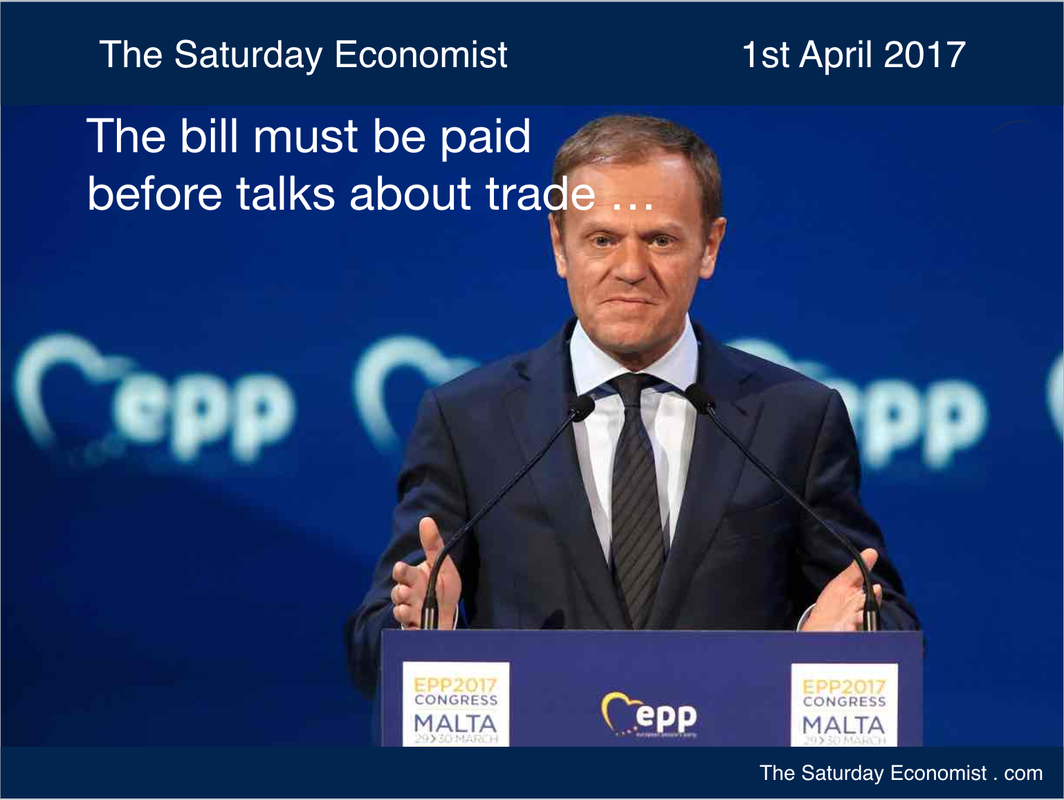 The Prime Minister signed the letter triggering Article 50 this week. We are leaving the European Union. Theresa May made clear, we are not leaving Europe. Excellent! How would that work exactly? We still want to be friends with our European allies with a "deep and special" relationship in the future. This will include a Free Trade Deal and an immigration cap, especially on people from Eastern Europe. Promising. The response from President Tusk was clear. There can be no discussions on future relationships until "satisfactory" progress has been made on the separation agreement. The EU will make the call as and when the time is right. There can be no cherry picking. No special "sector" deals. Nothing is agreed until everything is agreed. The EU will act in its own interests. The negotiations will be collective, with no bilaterals. The EU seeks a close partnership in the future but will be prepared to "walk" if no deal is secured. The UK seeks to secure an ambitious Free Trade agreement with the EU. President Tusk makes it clear a Free Trade Deal is on the table, as long as certain conditions are met. Mutual guarantees relating to rights of EU citizens in the UK and UK citizens in the EU is one. It is more or less a given. The big and perhaps only problem will relate to the "sordid topic of coin". A single financial settlement must be made to reflect "obligations" undertaken before the date of withdrawal. The bill must be paid before talks about trade. The Prime Minister has made it clear, payment will be made. But how much? The quantum paid will have to satisfy the demands of the EU and the Tory back benches. Ah there's the rub. Nothing is agreed until everything is agreed. How long will it take? "Negotiations extend into the time available" is the general norm. Two years less the time for ratification is the guideline. Ratification by 37 EU national and regional parliaments on the one side, approval from the Tory hard liners and Westminster on the other. Ratification will eat into the time slot. Who will win the ratification race? Can one side ratify in isolation? There may be an "I will if you will" moment in the months ahead. Gratuitous insertions about Spain and Gibraltar, the EU and Eire will raise eyebrows and temperatures amongst Eurosceptics in the UK. Demands for a second referendum in Scotland will provide additional complication. Reasserting the Spanish right to veto as far as the Gibraltar is concerned, will merely wave a red (and yellow) flag to Tory bulls. Economic news this week ... The ONS released the latest update for UK growth in the final quarter of 2016 on Friday. There were but modest revisions in the data. Overall growth remains at 1.8% for the year as a whole, fueled by consumer spending and leisure sector output. Imports increased by 2.8%, exports grew by 1.8%. The trade deficit grew to £37 billion compared to £30 billion in 2015. The savings ratio fell to just over 3%. Concerns about household debt are increasing. The service sector is driving recovery, with over 5% growth in the leisure sector. Construction increased by 2.4%, manufacturing output increased by just 0.7%. The current account deficit increased to 4.4% of GDP compared to 4.3% in 2015. The ONS may provide some solace in the deficit reduction to just 2.5% of GDP in the final quarter. Let's not get too excited just yet. The data is volatile and subject to revision. For the year as whole, we expect growth to continue into 2017. Growth of 2% to 2.4% still appears to be possible. Inflation is on the rise but an earnings increase will offset the real income squeeze for households. The latest Nationwide house price data suggests house prices fell in March compared to the month earlier. Should we worry about that? Not really! The year on year growth slowed to 3.5% from 4.5% prior month, still significantly ahead of earnings and impacting on the affordability index. Will Brexit fears impact on growth? Hopefully not. We expect an amicable separation agreement, leading to a transition period and a free trade deal. No hard landing. No WTO rules. Motor, aerospace, financial services and big pharma may have to pay the price of a new global Britain, West Wing ... Whisky Tango Foxtrot ... It has been another tough week for the President. Tired and cranky, Trump walked out of an Executive Order signing ceremony at the end of the week, without signing the Executive Order!. Difficult questions about Mike Flynn's immunity caused the President to leave the party and retreat to private quarters. Suffering from the healthcare bill set back, Trump blamed the Democrats not offering any votes to support the badly drafted bill. "We had no democrat support, we had no votes from the democrats, they weren’t going to give us a single vote. It was a very difficult thing to do. It really would have worked out better if we had some Democrat support." Of course it would. Even better had the Republicans followed the whip! Trump declared war on the Freedom Caucus this week. Thirty right wing republicans essential for any majority in the house. "We learned a lot about the vote getting process, so for me it been a very interesting experience": said Trump this week. Who would have thought the Democrats would vote against the bill to abolish Obama care. "Doing big things is hard" explained Paul Ryan. "Health care is complicated" added Trump. Who would have thought running a country could be so difficult. International relations are about to become more difficult. Next week the Chinese are in Florida. President Xi won't be staying at Mar-A-Lago. He's worried about bugging and wire taps! Ironic! That's all for this week from the West Wing Whisky Tango Foxtrot ... So what happened to Markets? The Dow closed at 20,712 from 20,634. The FTSE closed at 7,322 from 7,336. Sterling was up against the Dollar to $1.253 from $1.2439 and was up against the Euro to €1.172 from €1.156. The Euro moved down against the Dollar to 1.069 from 1.080. Oil Price Brent Crude closed at $52.691 from $50.81 The average price in March last year was $41.58. UK Gilts - yields moved down. UK Ten year gilt yields closed at 1.12 from 1.21. US Treasury yields held at 2.41. Gold closed unchanged at $1,247. John That's all for this week. Don't miss our next economics update in Manchester on the 18th May. © 2017 John Ashcroft, Economics, Strategy and Social Media, experience worth sharing. ______________________________________________________________________________________________________________ The material is based upon information which we consider to be reliable but we do not represent that it is accurate or complete and it should not be relied upon as such. We accept no liability for errors, or omissions of opinion or fact. In particular, no reliance should be placed on the comments on trends in financial markets. The receipt of this email should not be construed as the giving of advice relating to finance or investment.. ______________________________________________________________________________________________________________ If you do not wish to receive any further Saturday Economist updates, please unsubscribe using the buttons below or drop me an email at [email protected]. If you enjoy the content, why not forward to a friend, they can sign up here ... _______________________________________________________________________________________ For details of our Privacy Policy and our Terms and Conditions check out our main web site. John Ashcroft and Company.com _______________________________________________________________________________________________________________ Copyright © 2017 The Saturday Economist, All rights reserved. You are receiving this email as a member of the Saturday Economist Mailing List. You may have joined the list from Linkedin, Facebook Google+ or one of the related web sites. Our mailing address is: The Saturday Economist, Tower 12, Spinningfields, Manchester, M3 3BZ, United Kingdom.
0 Comments
Leave a Reply. |
The Saturday EconomistAuthorJohn Ashcroft publishes the Saturday Economist. Join the mailing list for updates on the UK and World Economy. Archives
July 2024
Categories
All
|
| The Saturday Economist |
The material is based upon information which we consider to be reliable but we do not represent that it is accurate or complete and it should not be relied upon as such. We accept no liability for errors, or omissions of opinion or fact. In particular, no reliance should be placed on the comments on trends in financial markets. The presentation should not be construed as the giving of investment advice.
|
The Saturday Economist, weekly updates on the UK economy.
Sign Up Now! Stay Up To Date! | Privacy Policy | Terms and Conditions | |

 RSS Feed
RSS Feed